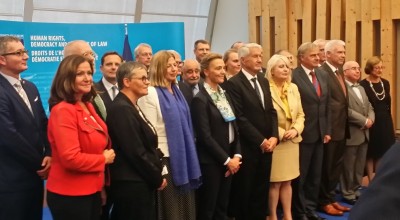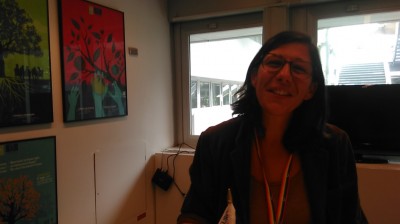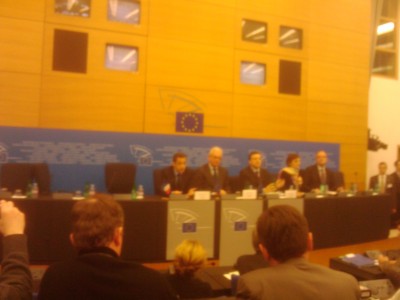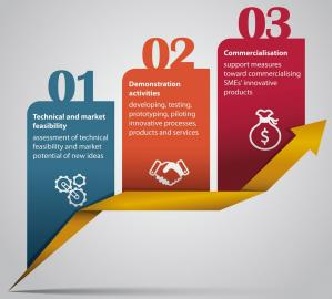 newsitems
newsitems  PanEuropean CoE kickStarts ReNovated Data Protection Treaty with EU + Russia Support, but Global Aim
PanEuropean CoE kickStarts ReNovated Data Protection Treaty with EU + Russia Support, but Global Aim
PanEuropean CoE kickStarts ReNovated Data Protection Treaty with EU + Russia Support, but Global Aim

*Strasbourg/CoE/Angelo Marcopolo/- It's with Stong Support by Both the Franco-German core of the EU, but also the UK, and Russia, as well as various key Countries from Other Continents, that CoE's PanEuropean Organisation succesfully Launched Today, in its Headquarters in Strasbourg, the collective signature of its ReNovated Treaty on Data Protection, a Domain in which CoE is an Historic Pioneer, already as early as since the 1980ies, but which clearly has, Nowadays an Ambitious Aim to Both UpDate (in Digital, Trans-Border Data Flow, Artificial Intelligence, Genetics, and National Security new Challenges), and particularly Extend its Legal Mechanism towards a Trans-Continental, (open also to Other Regional/International Organisations) and even Global Horizon in the foreseable Future.
Carefully Negotiated, previously, Both with the EU, (including a very active UK, despite or most probably because of its imminent BREXIT), and with Russia, as well as Other European and Non-European Countries, CoE's New, ReNovated Convention for the Protection of Persons vis a vis the Automatic Treatment of Personal Data, (known as Treaty "108 +"), now has an largely Similar Content to that of EU's brand New relevant "Directive", which has just Entered into force Earlier this Year, but is Strongly Backed by the EU mainly Because it offers a Unique Possibility to considerably Extend the Area where such Rules are applied, also throughout Other European, Non-EU Countries, as well as accross a much Wider, International Space.

- This is, indeed, the Main Interest for the EU to Back this Move, and for EU Member Countries to Join it too, stressed in Reply to an "Eurofora"'s Question, the competent CoE's Director for Data Protection, Sophie Kwasny, during a Press Briefing with Journalists earlier in Strasbourg. In Exchange, Non-EU and even Non-European Countries, by Joining that move, become able to claim that they use the Same Rules as all Europe, in such an extensively Trans-Border Issue Nowadays as Personal Data's protection, she added.
+ Thus, it's mainly at the Creation of "a Unique Forum for Cooperation in this field at Global Level", that CoE's Secretary General, Thornbjorn Jagland, a former Prime Minister of Norway, pointed during his Speech at the event organized Today for the Opening to Signature of that Convention's New, Amending and UpDating Protocol.
- Concerning such EU - CoE Cooperations in general, the New EU Ambassador to Strasbourg, former EU Commissioner and Foreign Minister of Bulgaria, Miss Kuneva, recently stressed, indeed, that what is really at Stake is "Global Governance", (See, f.ex.: ..., etc).
=> Thus, among the 21 States' Representatives, who Signed Today this New CoE's Legal Instrument for Data Protection, are Included also the Franco-German "core" of the EU, as well as the UK, Together with Other Both Western (f.ex. Spain, Austria, Sweden, Netherlands, Belgium, Portugal, etc) and Eastern EU Member States, (f.ex. Estonia, Finland, Czech Republic, Latvia, Lithuania, Bulgaria, etc), including several Small but particularl Active in Trans-Border Data Flows, Countries, (such as Luxembourg, Ireland, etc), extended also to key Non-EU but European Countries, from Norway to Monaco, and particularly Russia, but even a Non-European Country from Latin America, as Uruguay, (in fact, an Original Country with a Unique Synthesis of various European Origin Populations, and an Economy, as well as a Strategic Location, which is often Compared to a kind of Latino-American Switzerland)...
+ Moreover, well Beyond EU's 27 and CoE's 47 Member States, the Historic CoE's Old Convention on Data Protection, (a Pioneer Legal tool dating from the 1980ies), has Already attracted anOther 6 Non-European Countries, (Both from Africa : Tunisia, Senegal, Cabo Verde, Mauritius, and soon Morocco, Burkina Faso, as well as from Latin America : Mexico, and soon Argentina, etc), Totaling 53 current and 56 Future Members, while there are also Various Other Countries accross the World, which have reportedly used CoE's Convention as a "Model", and participate as "Observers" in its Monitoring Committee, gathering almost 70 Countries, until now.
Among its various Innovations, this CoE's New Legal Instrument includes also Persons' Rights vis a vis Algorithms f.ex. in Artificial Intelligence, has UpGraded Genetic and BioMetric Data in the Categorie of "Sensitive" Data, and deals even with "National Security" issues, (on the Basis mainly of ECHR's case-law), while the EU's Directive does Not, since the EU prefers to do that through Specific Tools concerning Police Cooperation, etc.
Another Original character of this New CoE's Tool, is that it provides also for a Accelerated Entry into Force, at least among those Member States which will Ratify it, even BEFORE the accession of All the 53 current Member Countries of CoE's Old Convention on Data Protection, dating from the 1980ies : From the moment that at least 38 Member Countries will have Ratified it.
=> I.e. the New Rules can Enter into Force with Only +17 more Member States, (in Addition to the 21 which have already Signed Today), while CoE itself has 47 Member States. I.e. in a rather Short Foreseable Future, (which will also set Immediately in motion the ReNovated Convention's "Monitoring" Mechanism, already prepared and Ready to Start Working asap).
Last, but not least : Significant of the Interest that the Incoming, New CoE's rotating Presidency by Finland (November 2018 - May 2019) shows for this ReNovated and Extensible Data Protection, is also the Fact that it send to Strasbourg's event of Collective Signature, its Seretary of State, in the Foreign Ministry, Matti Anttonen, while Lithuania also send its vice-Minister of Justice, Irma Gudziunaite, all the Other Signatory Countries having used their Ambassadors/Permanent Representatives to the CoE, (with the only Exception of Uruguay, which send to Strasbourg's ceremony its Ambassador to France).
---------------------------------------
Main Menu
Home Press Deontology/Ethics 2009 Innovation Year EU endorses EuroFora's idea Multi-Lingual FORUM Subscribers/Donors FAQs Advanced search EuroFora supports Seabird newsitems In Brief European Headquarters' MAPs CoE Journalists Protection PlatformBRIEF NEWS
- 00:00 - 02.06.2021
- 00:00 - 18.10.2020
- 00:00 - 19.06.2020
- 00:00 - 18.05.2020
- 00:00 - 20.04.2020
- 00:00 - 02.02.2020
- 00:00 - 09.12.2019
- 00:00 - 27.11.2019
- 00:00 - 16.11.2019
Popular
- Yes, we could have prevented Ferguson riots says World Democracy Forum's Young American NGO to ERFRA
- Spanish People Elect CenterRIGHT Majority with 1st Party and Total of 178 MPs (6 More than the Left)
- Pflimlin's vision
- The European Athletic "Dream Team", after Barcelona 2010 Sport Championship Results
- Source Conseil d'Europe à ERFRA: Debatre Liberté d'Opposants à Loi livrant Mariage+Enfants à Homos ?
- Head of BioEthics InterGroup, MEP Peter Liese : "Embryonic stem cell research reaching its END" !?
- Spain: Jailed Turkish Terror suspect with Explosive,Drones,Chechen accomplices stirs Merah+ Burgas ?
- UN Head Ban Ki Moon at CoE World Democracy Forum : - "Listen to the People !"
Latest News
- EUOmbudsmen Conference 2022: Digital Gaps affect People's Trust threaten EF Project on EU Future ?
- French Election : Black Out on Virus, but Obligation for Fake 'Vaccines" Challenged
- Both French Presidential Candidates point at "Humanism" in crucial times...
- France : Zemmour = Outsider may become Game Changer in Presidential + Parliamentary Elections 2022
- PACE President Cox skips Turkey Worst (Occupation) case compared to Russia (DeMilitarisation) query
Statistics
Visitors: 58968789Archive
Login Form
Other Menu

Recent developments proved that Europe can suceed to overcome challenges by aiming at great objectives, and this is needed also in 2009, said EU chairman, French President Nicolas Sarkozy.
- "It's in the name of Great Ideas, Projects, Ambition and Ideals, that EU can overcome" challenges, stressed Sarkozy at EU Parliament in Strasbourg, in conclusion of a dense 7 months EU Chairmanship. "It's even easier for Europe to have Great projects, able to overcome national egoism, instead of limiting itself only to small projects" (unable to do alike), he observed.
- "Europe must remain Ambitious and understand that the World needs her to take Decisions". "The World needs a Strong Europe", which "thinks on its own, has convictions, its own responses, its imagination" : "A Europe which does not limit itself into following" others, (as it did in the Past, when it followed USA, f.ex. on Bosnia). On the contrary, "Europe should undertake its own responsibilities", he said, after a series of succes in stopping the War between Russia and Georgia, and organizing the 1st EuroZone's Summit in Paris, which incited the Washington DC G-20 Summit to extend similar decisions World-wide.
- "When you sweep it all under the carpet, prepare yourself for hard tomorrows", he warned. "What hinders decisions is the lack of Courage and Will, the fading away of Ideals", he stressed before EU Parliament's 2008 debate on Human Rights and Sakharov prize on Freedom of thought attributed by MEPs to Chinese cyber-dissident Hu Jia, followed by an EU - Turkey meeting on Friday.
- "I don't abandon my convictions" and "I will take initiatives" on EU level also in 2009, Sarkozy announced later. "France will not stop having convictions and taking initiatives" on Europe. + "It's an Error to wish to pass over the Heads of those who are elected in their Countries" : "It's an integrism I always fought against"', he warned.
---------------------
French EU Presidency faced 4 unexpected Crisis :
- An institutional crisis, with the Irish "No" to EU Lisbon Treaty, just before it started. A geopolitical crisis, wth the threat of War between Russia and Georgia risking to throw Europe back to Cold-war divisions, on August. A World-wide Financial and Economic crisis, arriving at a bad moment before crucial 2009 EU elections. And even a Strasbourg's mini-crisis, with EU Parliament's roof curiously falling down, from unknown reasons, in a brand new building on August, provoking an unprecedented transfert of the 2 September Plenary Sessions...
But it wasn't enough to stop Sarkozy ! On the contrary, it stimulated him...
---------------------------------------
- "The better way to deal with the recent problems of EU institutions (as the "3 NO" by France, the Netherlands and Ireland) is to take them as a "Test" in order to find solutions closer to Citizens' concerns", said later in Strasbourg Sarkozy's new choice as Ministe for EU affairs, Bruno Le Maire.
- On the Institutional front, Sarkozy gave Time to the Irish to think about it, and stroke on December a deal including a New Referendum after the June 2009 EU Elections, in exchange of a promise to keep the rule of "one EU Commissioner for each EU Member Country", and some opt-outs on Defence and Fiscal EU policies, Abortion, etc. If the Irish get a "Yes" Majority, then the institutional package could be completed in 2010 or 2011 on the occasion of Croatia's probable EU accession.
He was accused in Strasbourg to upgrade EU Council and downgrade EU Commision, but he replied that "strong Political initiatives by EU Council reinforce also the more technical role of EU Commission, under the political-technical leadership of its President", all 3 "working together with EU Parliament".
- But, meanwhile, Sarkozy energetically spearheaded an Historic 1st Summit of EuroZone's 15 Heads of State and Government at EU's core, exceptionally enlarged to a partial participation of British Prime Minister Gordon Brown, on October 12 in Paris' Elysee palace, which started to tackle succesfully the growing world Financial crisis.
It also paved the way for its endorsement by a subsequent Brussels' 27 EU Member States' gathering, before it all come to Washington's G-20 Summit. And "Europe was united, it asked for the 1st G-20 Summit, and it will also organise the next G-20 Summit on April in London", he observed.
But a Conference with EU, Russia, African and other Developing Countries, hosted in Strasbourg shortly after Washington G-20 Summit by the French EU Presidency, took a Resolution asking to enlarge participation to Global Economic Governance. Many found, indeed, illogic and unacceptable that f.ex. states as Turkey were given a seat at G-20 level, while all African Countries, and even the African Union itself, representing the greatest Continent on Earth, were excluded...
Meanwhile, even USA''s "Paulson No 3" Plan, was, in fact, inspired by Europe's No 1 Plan", Sarkozy observed, largelly applauded by MEPs.
And "Europe showed Solidarity" by mobilizing some 22 Billion credit for Hungary, 1,7 billion for Ukraine, as we do nowadays for Baltic States, etc., he added.
The move on Economy was extended on December by an EU stimulus' plan totalling some 200 billion Euros, including 5 Billions released by EU Commission for big Projects, as well as various parallel National plans for Economic revival, (fex. 26 billions in France alone). They might appear limited, compared to USA President-elect Obama's reported plan to boost the American economy with 800 billion $, but at least succeded to overcome Europe's divisions for the first time on Economic governance, opening new horizons.
- The French President stressed even harder the unique role of an active EU Council's chairmanship, when he moved swiftly and efficiently, at the beginning of August, to succesfully stop War between Russia and Georgia, at the last minute, which threatened to bring Europe back to Cold War division.
"We (EU) also wanted to avoid a situation like in Bosnia, in the Past, when EU was absent, so that our American friends took their responsibilitues, and EU only followed", despite the fact that the conflict took place in Europe. Now, it was the EU who took its responsibilities".
A roadmap towards a new PanEuropean Security policy, before which all unilateral moves to place new Missiles (from USA or Russia) would be freezed, was proposed by Sarkozy after a meeting with Russian president Medvedev, at the eve of Washington DC's G-20 Summit.
Ukraine's "European" character was stressed at a Sarkozy - Jushenko Summit, September in Paris, while EU adopted on December an "Eastern policy", in which, "I'm convinced that our (EU's) future is to find with our Neighbours the conditions for Economic Development. Peace and Security, by explaining them that.. they must respect (Human Rights') Values, and adopt behaviors different from the Past", explained Sarkozy in Strasbourg.
Meanwhile, the "Union for the Mediterranean" was created, since July's Summit if 45 Heads of State and Government in Paris, as "an organisation for a permanent Dialogue, that we need", mainly in order to tackle the Israeli-Palestinian conflict, by bringing together, for the 1st time, Israelis and Arabs, where "Europe must be present, in order to avoid a frontal clash".
- "If Europe doesn't take its part for Peace in the Middle-East, nobody else will do that in our place", Sarkozy stressed.
-----------------------
Meanwhile, other EU Agreements were brokered during the French EU Presidency on Immigration, (fex. common Asylum rules, etc), and Climat- Energy :
- On Climat-Energy, the 2007 German EU Presidency had fixed a triple 20% aim for 2020 (20% renewable Energies, 20% reduction of CO2 emmission, 20% energy efficience/economies), and the 2008 French EU Presidecny realized that, making the necessary compromises in order to modernize EU's industry, but without throwing some former Central-Eastern European Countries into abrupt Economic break down risking "social explosion".
- Defence-Security EU policy was mainly postponed for April 2009, since both German chancellor Merkel and French president Sarkozy want to strike a deal with the new American president Obama in Strasbourg's NATO Summit.
However, with all these 4 unexpected Crisis diverting attention to other urgencies, People wil wonder now, what happened to the famous deal proposed by freshly-elected French President Sarkozy on Turkey's controversial EU bid, back on August 2007, to continue EU - Turkey negotiations, but on the double condition that core chapters, intrinsequally linked with EU Membership, will be excluded, and that a collective Reflexion and Debate on Europe's future would start before the end of 2008.
It was meant to reply to the crucial question : What kind of Europe do we want in 10 or 20 Years from now : A large Market, or a Political Europe, with a popular identity ? In Sarkozy's thinking, presented in his 2 landmark speeches on Europe in Strasbourg, shortly before and after the 2007 Elections, (on February and July 2007), Turkey's controversial EU bid would be incompatible with the second choice.
It's true that EU Commision's Chairman, Jose Barroso, (who had notoriously declared, as former Portuguese Prime Minister, that he found "nonsense" the idea that Europe might become equal to the US), had repeatedly tried to avoid that Sarkozy's criticism on Turkey might start winning a larger audience in Europe, preferring a discrete "wismens' committee" work. And that most of the personalities later chosen in order to participate in a Committee on Europe's Future, are too much linked with Socialist parties and/or American policies, to be really critical of USA's notorious wish to impose Turkey to the EU, as Sarkozy had noted himself since March 2007..
- "It's on EU Council's presidency to take political initiatives. EU Commission has other competences", stressed Sarkozy. The "European Ideal" is to "build Europe with the States, not against them". "Ask Europeans to chose between their countries and Europe won't work. You don't choose between your two parents : We must add them together".
"France and Germany have an Historic Duty to work together, precisely because of what happened to the Past. We have to work hand by hand. We cannot be separated.It goes beyond me and Mrs Merkel today, Mr Schroeder and Mr. Chirac yesterday. It's not a choice, it's a duty to Europe and to the World". "We need Germany, as Germany needs Europe". Compromise is inevitable, here as everywhere, and each one made some steps towards eachother's positions.
But "it's true that Mrs Merkel didn't chose her Socialist partners, while I chose mine", Sarkozy said, in an indirect hint that the Socialist Minister of Finance in Germany might be a cause of minor past disagreements in Economy, which were overcome in recent negotiations.
"We (France and Germany) have particular duties in Europe", but "in a Europe of 27 Member States, it's not enough for France and Germany to agree between them.
"I always thought that Great Britain has a special role to play in Europe. ... Now, everybody "saw what it cost payed the UK for having been too exclusively open towards the US (and) Financial services. Europe needs the UK, but also the UK needs Europe" :- "We were able to face the hardest moment of the Financial crisis because the UK clearly chose Europe", stressed Sarkozy, reminding Gordon Brown's exceptional participation to the Historic 1st Heads of State/Government Summit of EuroZone, October 12 in Paris (See EuroFora's Reportage from Elysee Palace then).
- "Some look at Europe with old glasses aged 30 years ago. While we must look at her in relation to what it will be in 30 years" in the Future, Sarkozy concluded.


















